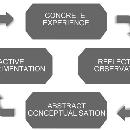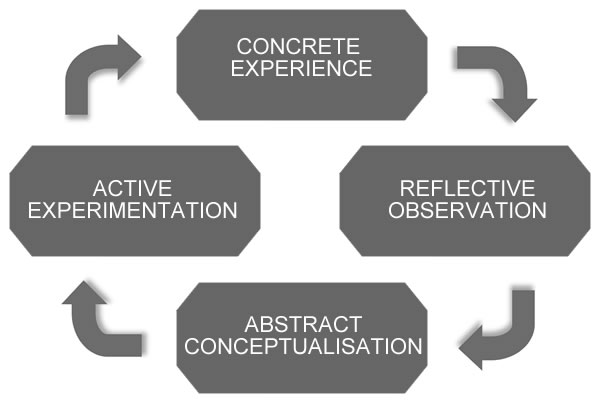 FMHS Everything Teaching
FMHS Everything Teaching
Contribute to scholarship, research and professional activity
What is reflection?
This section provides a broad overview of how reflecting on teaching can lead to development and to improvement of teaching practice.
The literature on reflection is extensive. However, one of the best known theories of reflection - Donald Schön's -states that there is a difference between "reflecting in action" and "reflecting on action".
Reflecting in action is the act of reflecting on what we know as revealed by what we do. Reflection in action is in the moment and directed towards what is known in the moment. An example of reflecting in action would be reflecting on an aspect of a particular teaching activity - e.g. a tutorial discussion - during the discussion. Schön suggests that this sort of reflection is caused by surprise at something that has happened. The surprise might be caused by the fact that a particular strategy is working very well or by the fact that the strategy seems to be failing. Reflection might include asking the question, "Why is this happening?" or "What has caused this?"
Reflecting on action occurs after the event and involves a conscious reflection on your reflections in action. This is an important point. When reflecting on action the way in which you reflect on the event itself is not by simply thinking about what happened, but also by exploring your initial 'in the moment' reflections in action, thinking about why things happened and what actions might be taken to address identified issues. Reflection in action is, according to Schön, is a process that uses the medium of words. Reflecting on action could therefore involve talking with others, writing a reflective commentary or simply thinking through the reflection in action.
According to Schön, reflection in and on action leads to new practice knowledge which can be applied to future teaching situations. This might be knowledge of how to do things better or it might be the knowledge that something has worked well and can be tried again. We might describe this sort of knowledge as "actionable theory" (knowledge in use) that can be tried and tested in a new teaching situation. Further reflection in and on action will again lead to new practice knowledge or to new actionable theory. The skills of reflection are part of the toolkit of the reflective practitioner. In Schön's theory of reflection, concrete experience leads to reflection which in turn leads to actionable theory. The teacher tries something new having thought about a particular teaching situation that provided a challenge or an opportunity. Experience, reflection and action can be understood in terms of David Kolb's experiential learning cycle (see Kolb in Further Reading).
Kolb stated that a learner can begin the learning cycle at any one of the four modes, but that it should be carried on as a continuous spiral. As a result, knowledge is constructed through creative tension among the four modes and learners will be exposed to all aspects of learning: experiencing, reflecting, thinking and acting.
Abstract conceptualization is the stage at which the learner comes up with a way to do things differently. The new way of approaching teaching might result from the process of reflection. For example, reflecting on a particular tutorial might lead to the conclusion that students were not engaged with the content and that students need to be taught in a way that demonstrates the relevance of the concept in the real world.
However, reflection may not always be sufficient to suggest alternative approaches to teaching. When this is the case the teacher might turn to peers or to the teaching literature. When literature is consulted the teacher is taking a scholarly approach to teaching which may lead the teacher to engage in the scholarship of teaching. Whether you are reflecting, being scholarly or engaging in the scholarship of teaching, the point of what you are doing is to improve your teaching to benefit student learning. This means that you must be systematic in what you do and that you must have a way to gauge whether the changes that you make ultimately benefit the students.
Portfolio Possibilities
 Check
Check
Do I...
- Reflect on how my teaching practice impacts on student learning?
- Understand and apply the theories that guide reflective teaching practice?
- Use reflective practice to engage in a more scholarly approach to my teaching?





